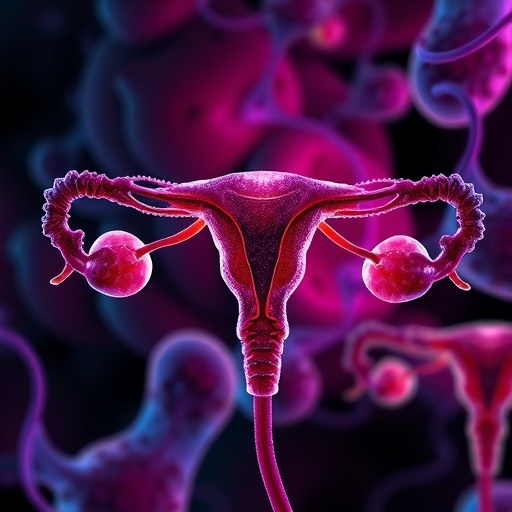In a groundbreaking study published in the Journal of Ovarian Research, researchers led by Tang et al. delve deep into the intricate world of autophagy within the ovary, presenting a thorough investigation into its protective roles, pathological consequences, and a plethora of unresolved issues. This profound exploration comes at a pivotal time when the understanding of ovarian health is crucial not only for reproductive biology but also for broader aspects of women’s health generally. This research sheds light on how autophagy, a process of cellular degradation and recycling, plays an indispensable role in maintaining ovarian function and health.
Autophagy, derived from the Greek words for “self” and “eating,” is a fundamental biological process that allows cells to eliminate damaged components and reorganize resources efficiently. Its importance becomes particularly evident when considering the ovarian follicles, which are highly dynamic structures responsible for oocyte development and hormonal regulation. The study highlights how a well-regulated autophagy process ensures that ovarian follicles can properly mature and function, emphasizing the relevance of this cellular mechanism in reproductive success.
One intriguing aspect discussed in the publication concerns autophagy’s protective roles during stress conditions. The ovaries are constantly under duress from oxidative stress and other insults, which can compromise their function. The authors point out that autophagy can clear damaged organelles and proteins, therefore safeguarding ovarian cells from degeneration. By helping cells to cope with stress, autophagy potentially prevents follicular atresia—a process where non-dominant follicles degenerate and get lost. This preservation is critical for maintaining ovarian reserve and hormonal balance.
Conversely, the study does not shy away from exposing the pathological consequences of dysregulated autophagy. While proper autophagic activity is beneficial, an imbalance, whether by excessive activation or inhibition, can lead to severe reproductive pathologies. The authors provide compelling evidence linking abnormal autophagy to conditions such as polycystic ovary syndrome (PCOS) and premature ovarian failure. Such insights urge the scientific community to consider autophagy not just a cellular housekeeping process but a significant contributor to various ovarian dysfunctions.
The research touches upon the unresolved issues that persist in the field of ovarian autophagy. While considerable progress has been made in understanding the general principles of autophagy in other tissues, the specific mechanisms and regulatory pathways involved in the ovaries are less well-characterized. For instance, the researchers call for more studies to elucidate the role of autophagy-related genes in ovarian function, particularly in the context of aging and fertility.
Moreover, the article emphasizes the need for further exploration into how external factors, such as environmental toxins and dietary components, may influence autophagy in ovarian cells. Understanding these interactions will not only illuminate the complexities of ovarian biology but also pave the way for novel therapeutic approaches that may enhance fertility and overall reproductive health in women.
Interestingly, the researchers also draw attention to the potential of harnessing autophagy modulation as a therapeutic strategy. By developing drugs that can finely tune autophagy, there lies a promising avenue for treating ovarian pathologies. This could be particularly relevant for conditions that closely relate to female infertility, as targeted therapies could restore normal function and possibly enhance reproductive outcomes.
The implications of such findings extend beyond basic reproductive health. Research on autophagy in ovarian tissues could also provide insight into the multifactorial influences on ovarian cancer. The interplay between protective autophagy and the survival of cancer cells in the ovarian environment remains an area ripe for investigation. Clarity in this domain could contribute to the development of more effective cancer therapies, highlighting a crucial crossroad between reproductive health and oncology.
Another critical point made by Tang et al. is the role that lifestyle factors play in modulating autophagy within the ovaries. Factors such as exercise, diet, and stress management are known to influence autophagic activity. The researchers advocate for a more holistic approach to women’s health, one that integrates lifestyle interventions aimed at optimizing autophagic function as a means to enhance reproductive health and longevity.
The publication also delves into the translational potential of their findings. As the landscape of reproductive medicine evolves, understanding the autophagic processes in ovarian biology can lead to innovative diagnostic and prognostic tools. This knowledge could empower clinicians to better predict fertility outcomes and tailor fertility treatments based on individual autophagic profiles.
In summary, the work by Tang et al. not only contributes to the fundamental understanding of ovarian biology but also brings to light the pivotal role of autophagy in female reproductive health. It serves as a clarion call for future research to address the gaps in knowledge surrounding ovarian autophagy, with the potential to unlock new therapeutic avenues for managing reproductive disorders and diseases.
In conclusion, this study is an essential addition to the corpus of research surrounding ovarian health, highlighting the complex interplay between cellular processes and reproductive function. As the authors underscore, the next decade of research focused on ovarian autophagy will likely uncover critical insights that can transform clinical practices and improve the lives of countless women affected by reproductive health issues.
Subject of Research: Autophagy in the Ovary
Article Title: Autophagy in ovary: protective roles, pathological consequences, and unresolved issues
Article References:
Tang, X., Gao, X., Wu, T. et al. Autophagy in ovary: protective roles, pathological consequences, and unresolved issues.
J Ovarian Res 18, 202 (2025). https://doi.org/10.1186/s13048-025-01784-2
Image Credits: AI Generated
DOI: 10.1186/s13048-025-01784-2
Keywords: Autophagy, Ovarian Health, Reproductive Biology, Follicular Atresia, Women’s Health, Fertility, Ovarian Cancer, Lifestyle Factors, Therapeutic Strategies.




